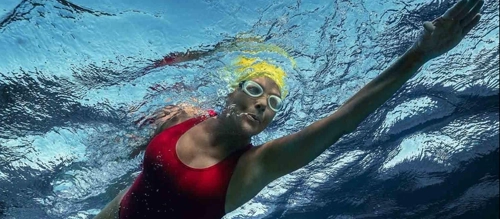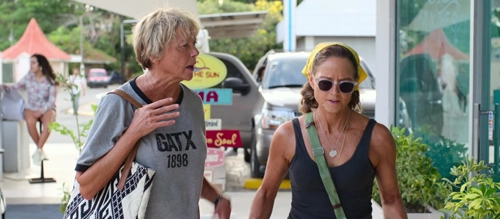
Nyad (2023)
Directors: Jimmy Chin, Elizabeth Chai Vasarhelyi
Screenwriter: Julia Cox
Starring: Annette Bening, Jodie Foster, Rhys Ifans
Nyad, one of three Netflix originals that has found its footing in the Oscars acting categories, has largely remained on the periphery of moviegoers. The two nominations it secured, Best Lead Actress and Best Supporting Actress, have become eclipsed, particularly by Lily Gladstone and Emma Stone for Lead Actress, and Da’Vine Joy Randolph sweeping in Supporting thus far. It’s widely agreed upon, however, that though they may not be the frontrunners of the race, the best takeaways from Nyad are its performances by Annette Bening, who plays the swimmer with a great-named fate, and Jodie Foster as Bonnie Stoll, Nyad’s best friend and exceptional coach.
While there is much to be said about the real-life asterisks surrounding Diana Nyad’s historic swim from Cuba to Florida at the age of 64, directors Jimmy Chin and Elizabeth Chai Vasarhelyi focus on the triumph of Nyad’s four additional attempts after failing to swim the Florida Straits at 28. The film begins in 2010 when Nyad celebrates her 60th birthday and finds herself, as most aging folks do, reflecting on her life and asking, “What if there is more for me?” In order to become the first person to complete the swim unaided, she must swim 110 miles and be two ankles out of the Florida Keyes without being touched, a feat thought to be impossible.
It’s tempting, then, to isolate Nyad and its narrative qualities as another entry into the biopic genre, spotlighting an athlete rather than the recent frequency of entertainment celebrity biographical films. Like other sports films, it is a story about honoring the teamwork it takes to make a dream work (if a consolidated team for narrative flow). Common archetypes include the Over-Confident Athlete with much left to learn, the Smart but Underappreciated Coach, the classic recruitment sequence of teammates with quirky qualities, and flares of the athlete’s difficult past that stand to block their passage forward. “Flares” are used in a literal sense, as Nyad insists on draping all of the swimmer’s flashbacks in a fuzzy, colorful glow that quickly becomes distracting and, honestly, odd. It is most uncomfortable when the same effect used to halo the tenderness between a young Nyad and her fellow teammate holding hands under the water is also used during scenes depicting Nyad’s sexual assault by her coach, Jack Nelson. Clearly, not all moments of the past are created equal, yet the cinematography fails to enforce this narrative separation, leaving the scenes of pain not only looking but feeling hollow. The film’s lighting is best commanded during the nighttime shots in the water, the pulsating red light used to see and protect Nyad, stunning in its vibrance amidst a pitch-black vast sea. The film distinguishes itself in existence rather than essence, drifting from typicality in focusing on an athlete no longer in their “prime,” not depicting Nyad’s life story chronologically, but instead using her present to unravel her past. Still, this choice is not enough to sustain long-term interest in the film, as seen by the film’s less-than-enthusiastic reception.
The 2013 film 42, about baseball player Jackie Robinson, comes to mind. Similarly to Nyad, the film itself wasn’t highly regarded, but its performances found praise. It’s worth noting then that lead actor Chadwick Boseman did not earn an Oscar nomination for 42 and was never recognized by the Academy, reminding everyone of the Academy’s confusing and sometimes distasteful weakness for a baiting biopic if, and when, it meets their skewed standards.
Nyad is not a particularly memorable film, but it does offer buoyancy through Bening and Foster’s comedic dynamic, allowing for the film’s most unexpected though refreshingly welcome element: its sense of humor. Nyad is immediately introduced to carry the likely ego of a self-determined athlete, and the script elucidates these qualities with a levity that Bening and Foster dance with. This film strives not to be an insular tale about one person’s feat and instead explores the duo at the core of the story, though this is at the risk of playing it safe in terms of just how much it scrutinizes Nyad in favor of a heroic story of gratitude and generalized combined effort.

Take, for example, A League of Their Own, which also documents female athleticism against the odds, though more fictionalized. In it, sisters Dottie and Kit swing at the center, their competitiveness and tension creating the more intimate push and pull of the story, though the film is also clearly about the team’s bond and sense of community. With Diana Nyad being a real person from whom the story stems, the film bears the responsibility of navigating the likeability and infamy of one specific athlete with faults often broadcasted to the public, and only mildly reckons with them, its bigger significance falling short but its quieter moments between Nyad and Stoll being most resonant.
Together, Nyad and Stoll infuse life into an otherwise run-of-the-mill biopic, most admirably capturing familiar and comforting imagery associated with older lesbians, including dinner-table scrabble and editions of The New Yorker collecting dust in the corner. The self-awareness laced into their friendship is cause for actual delight in those early scenes, one line said by Nyad to Stoll is particularly perfect, “You know Mary Oliver?” Her willed intensity, so critically emphasized in the film before the story finally submerges itself in Nyad’s physical journey, makes for an interesting juxtaposition as she is, for once, quiet in the water, steadily singing to herself and stroking along. This jarring silence stings even more when Nyad is forced to acknowledge each failed attempt, Bening’s gargled and raspy pleas to stay not only feeling that much more desperate, but reminiscent of the palpable selfishness engrained in her desire to keep going, even if her crew is struggling. If only on its murky surface, the film recognizes the contradictions existing within Nyad, someone who proclaims to not “believe in imposed limitations” but does, in fact, dedicate herself to imposed destiny, often at the expense of those who have prioritized her “impossible” dream for years.
Foster, too, balances the burden of what it means to be the supporting character in someone’s life while capturing the immense strength, resilience, and compassion it takes to help mold a successful athlete and more accountable friend. It is not the most well-baked dynamic, but it does feel genuine and inspired by truth. When Stoll mentions that Jack Nelson, the aforementioned former swim coach who assaulted Nyad and other teammates, has died, Stoll adds, “I wish I could’ve killed him myself. I would’ve, too.” While there has been backlash regarding the film’s maneuvering of Nyad’s assault, this specific line is one that most women can relate to, either having said it to a friend in pain or having heard their other half offer it back. It’s a special sentiment in a film so eager to rebel against stereotypical notions of what it means to be an aging woman, not because it has anything to do with athleticism or success, but because when images of girlhood and coming-of-age so often feature the unforgettable friendships deeply intertwined within that, it’s valuable to recall that deep love with platonic soulmates only becomes more beautiful with age and never stops mattering in the story of one’s life.
With its most indelible filmmaking features being awkwardly absurd ones, including an underwater yellow brick road leading to the Taj Mahal, Nyad does have some heart to it, shared between the women at its core who make it “two ankles out” of an otherwise okay film.
Score: 10/24
Written by Ariana Martinez
You can support Ariana Martinez in the following places:
Website: Awake in the AM
YouTube: @awakeintheam

